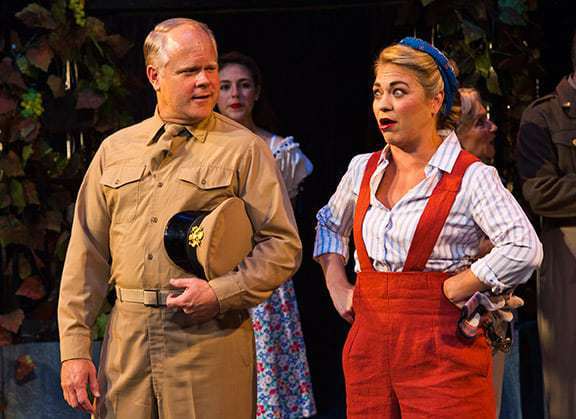
A successful production of Shakespeare’s “Much Ado About Nothing” must satisfy three requirements: Beatrice and Benedick — the lovers in a merry war of wit — have to be lovable, the story needs to be clear, and the jokes have to land.
Even Kenneth Branagh’s otherwise brilliant and definitive film of the play suffered from a horribly wooden villain in its Don John (Keanu Reeves), but it didn’t matter because Branagh’s Benedick and Emma Thompson’s Beatrice were so perfect. Although Joss Whedon’s 2013 film illuminated new aspects of the play, it hasn’t reached canon because his Benedick and Beatrice were so unlikable, their verbal sparring more cruel than jovial and funny. Laura Gordon’s new production of “Much Ado About Nothing” at Santa Cruz Shakespeare passes the test, with particularly strong performances from Greta Wohlrabe scene-stealing Beatrice and Mike Ryan’s Benedick. This is one of the summer’s must-see plays.
As the production is set in the 1940s, the first sign that Beatrice is a thoroughly modern woman, even before she speaks, is the fact that she wears sensible slacks. Although Wohlrabe’s harsh American accent requires some getting used to, her overwhelming charm and stage presence are what you’ll remember. When the play opens, she and her family receive a message that the Prince Don Pedro (Kipp Moorman) will be coming for a visit with his soldiers in tow, including Señor Benedick (Mike Ryan, a convincing and funny if somewhat juvenile Benedick). She need only say a few clever words to the messenger (Sharon Shao) for us to be completely mesmerized and on her side – hardly a surprise from a woman who made Celia one of the most interesting characters in last year’s “As You Like It.”

Nina Ball’s simple but versatile set places us on the front lawn of Leonata’s estate, where there are two benches arranged in a ‘V’-shape, a second floor balcony overlooking it, and a main entrance to the building centre stage. As the balcony and façade consist of metal framing festooned with flowers, we can see the action behind the entrance, a perfect design for a play full of spies and overheard misunderstandings. When the soldiers arrive, Gordon quickly establishes that they are in two camps: Don Pedro, Benedick, and his new best friend Claudio (Josh Saleh) enter by the stairs down stage right while the melancholy troublemaker Don John (Steve Pickering, wooden and blank) and his lackeys Borachio (Turner Frankosky) and Conrade (Carlos Angel-Barajas) enter stage left. The entire production is full of this kind of economical staging, which helps to clarify characters’ relationships and move the story along.
Before long, Beatrice and Benedick find themselves in a public battle of the wits, clearly steeped in sexual tension, even if the two insist that they hate nothing more than each other. That the audience laughed at each of their verbal poniards is perhaps the best proof that this is a highly lucid and understandable production, with a cast that can deliver Shakespeare to an audience unfamiliar with the play. But Benedick, you see, is a confirmed bachelor, convinced that nothing could persuade him into matrimony. So when he discovers his dear friend Claudio has fallen for Leonata’s daughter Hero (Sarah Traisman), he’s distraught, throwing a little tantrum like a teenager: “Will I never see a bachelor of three score again?!”.

Gordon does a terrific job of foregrounding how this is a play about people interfering in the love affairs of others. In the case of Beatrice and Benedick, their friends gang up to feed each of them “lies” about how much they are beloved by each other. For these two sworn celibates, it’s exactly the push they need to stop bickering and start bonding. They hit bliss when they finally shut up and kiss. The far simpler and more basic Claudio and Hero didn’t need such interference. Even once they become engaged, they have to be prompted to speak by Beatrice: words don’t flow out easily. But Claudio is easily influenced, whether it’s Don Pedro insisting on wooing Hero in Claudio’s name or Don John’s repeated, often successful, attempts to persuade Claudio to distrust the people he loves most.
Gordon’s attempt to even out the roles in the play between the men and women results in some clever and some problematic gender-swapping — a trend in recent Shakespeare productions. The smartest and best gender-swapping is of the minor characters whose gender is irrelevant. The night watchmen become young girl (and boy) scouts, including the girl in charge (Madison Kist), a girl with an endearing lisp (Isabel Pask), and one lone boy (Napoleon Jimenez), ensuring each are easily differentiable. Sharon Shao doubles up as the messenger and Balthasar, offering a lovely singing voice and a warm presence.

But Gordon’s decision to do away with the patriarchs (Leonato and Antonio) and replace them with matriarchs — Leonata (Patty Gallagher), the Governor of Messina and her sister Antonia (Suzanne Sturn) — is problematic. The change requires few adjustments in dialogue, though it does deprive us of one of the play’s best lines: when Don Pedro greets Leonato, he inquires if Hero is his daughter, and Leonato replies, “Her mother hath told me so many times.” It loses its punch when modified for Leonata.
The bigger issue is that “Much Ado About Nothing” is a play very much concerned with masculinity and fighting against the patriarchy. Does Beatrice’s “He that hath a beard” speech fit in a play where there are almost no men aside from the suitors and the evil-doers? One of the play’s key takeaways is the damage that patriarchal judgement can do: Claudio prioritizes the word of an untrustworthy man over that of his beloved Hero; Leonata believes him; and it sends Hero into ruin. Does it really make sense that a mother would be so quick to betray and condemn her daughter?
More importantly, Beatrice is a radical feminist figure despite being written hundreds of years before we had a word for it. She’s so wise that she inspires royal men to tell her that her “silence most offends [him].” She won’t be pushed to marry anyone less than her equal in intelligence, even when a man as worthy as Don Pedro proposes. She won’t put up with Benedick doing anything but respecting her. But if her crowning achievement is to smash patriarchy, is not this cheapened when there is no actual patriarchy to bump up against? I like the principle of giving more parts to women. I’m not sure gender-swapping all of these characters in this play is ideal though it’s certainly provocative.
“Much Ado About Nothing” runs at Santa Cruz Shakespeare until August 30. In July, it plays on Saturdays at 8 p.m. and Sundays at 2 p.m. In August, it alternates with the production of “Macbeth,” Wed.–Sun. at 8 p.m. with some 2 p.m. matinees on weekends. Tickets are $40-52. All student and youth tickets are $16 and there are discounts for military and seniors 62+. $20 rush tickets are available one hour prior to the performance. Click here for tickets and showtimes.

